April 2025 Watch
Saturday, 3 May 2025
Okay I got really into a book this week (“Everyone In My Family Has Killed Someone” by Benjamin Stevenson) and kept putting off writing the summaries for each of these things until I was done. I’m not going to give a full review of that book but suffice to say I really, really enjoyed it, and I’m already waiting on the sequel to arrive. I might go into a bit of a mystery novel phase, who knows. In the meantime, here are my responses for this month.
The Grand Budapest Hotel (2014, dir. Wes Anderson)
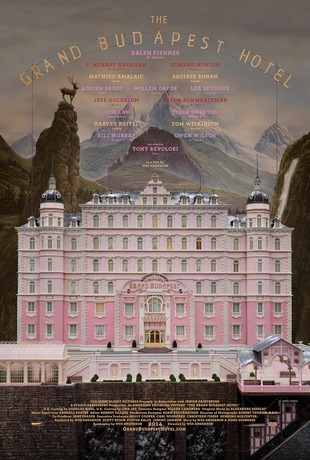
I’m not exactly sure why I had such a hard time writing this review… I definitely enjoyed this movie, I have a whole list of things I liked about it, yet when it came to putting something down on the page, I found myself struggling to write this month.
The Grand Budapest Hotel is about Monsieur Gustave, the head concierge at a big hotel, who has been accused of murder. It is told from the perspective of his friend and lobby boy, Zero, over a series of parts that more or less occur in different locations. There is a pervasive sense of an invented historical context that is nonetheless resonant with conflicts from reality, especially regarding questions of fascism and war.
So obviously this movie, like all Wes Anderson movies I’ve seen, is gorgeous visually. The symmetry and use of linear balance, bright colors, and other aspects of stylization are all true to Anderson’s visual style, but I have to say that it works especially well with this narrative. The questions of presentation and artifice that thread throughout the movie’s plot really come alive with the visual landscape. It really adds substance to a thread I found was just all right in the writing of it, instead turning to a subtle visual method of communicating it; that is, Monsieur Gustave’s relationship to the world around him, both the hotel and outside it, and the eventual impact on other characters. I’ll have a little bit more to say about the frame narrative, but the multiple time periods and the ways they were depicted emphasize the change over time and put the story into a wonderful fantastical-historical context.
Another filmmaking trait that worked very nicely was the breaking of the frame. Frequently we see characters come into frame from just offscreen and this blend of diegetic and non-diegetic sound (not that both are there, but that they are occasionally confused) that creates such rhythm. These made the world feel simultaneously expansive and fantastical, broader than what we see on-screen and at the same time entirely comprised of it. Once again, this works so well with the themes of the movie.
I thought the film’s story was really fun; it was quite different from what I anticipated, but I thought it worked well. The division into parts was especially intriguing; I have to admit, I really like when movies take this route, but it felt especially nicely done here. The number of parts was definitely not something I’d seen before, and it evoked the bookishness of the plot in a way I really liked that complemented the frame narrative. Now, I’m also a huge fan of frame narratives. I find the way they change the effect of a story is brilliant and engaging; this is not my favorite use of the frame narrative of all time, but that’s not to say I had particularly strong feelings against it. Its function seemed to be primarily to show the passage of time and how the main plot of the movie falls into a wider temporal context, which was nice although perhaps incongruous with some stated character motivations (I debate over whether you are meant to take the character at their word, and how each option impacts the story being told).
This was a really nice movie. I was charmed by the characters and the world they inhabited; the visual and storytelling style worked beautifully with the story being told. One of the main things that struck me was a cast with such distinct styles of speaking, and at times voices, all fitting into the world with such grace. I found that the emulation of grandiosity and fantasy and inundation narratively to tell what is a fairly simple story thematically, was very nice. The more I talk about it, the more I like this movie.
Mickey 17 (2025, dir. Bong Joon Ho)
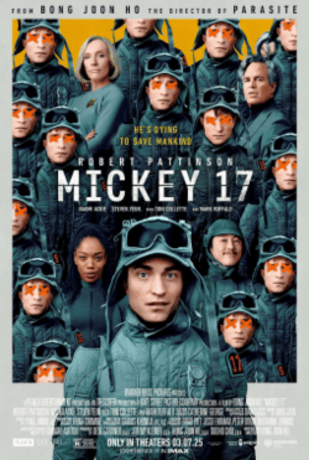
I love to see movies in the theater and I tried a new cinema for this one. I did not get an ICEE but I did make a mental note that they had an ICEE machine for future visits… It was kind of a scary one because the stairs to the seats were like really steep and I was afraid I was going to fall in front of the whole auditorium. Fortunately, I left unscathed.
Mickey 17 primarily follows the titular character, the seventeenth incarnation of Mickey Barnes, a man who signed onto a space colonization project as an “expendable,” an employee put on dangerous missions and cloned repeatedly as he dies on these missions. After nearly dying on one of these missions, Mickey 17 is cloned once more before returning, setting off a chain of events involving two simultaneous clones as the spaceship lands on the planet it intends to colonize.
I knew in the first five minutes my biggest—and frankly only—issue with this movie. In every other aspect I found it really strong. The visuals, the effects, the concept, and most of the cast were all excellent and utterly saved this movie for me, despite what I’m about to complain about. To that statement, I want to say that I enjoyed my time with this movie and I’m glad I saw it, but it’s unlikely I’ll watch it again.
This film was very well done despite its biggest issue: the screenplay. I found it weak despite competent work with story and narrative; on a central level it was inconsistent. The style of dialogue and more broadly the absurdity of the plot developments allowed it to sort of work for a good portion of the movie, but with a closer examination it does not stand to scrutiny. Compare two examples: the sauce versus continued the loan shark plotline. The sauce thing to me was utterly brilliant; I thought it was genuinely so funny and communicated what it needed to despite the strange non-specific specificity it involved. Toni Collette repeatedly being like, “My sauces!” was so funny and ridiculous. There was something similar in the utterly magical speed of the scientists’ developments in the final bit of the movie, which I appreciated. As for the loan shark plot, it worked as backstory but the way it returned later felt irrelevant and strange. I couldn’t figure out the reason for it, both on a character/story level and on a narrative significance level. It seemed to only be there to get that scene in the cages but didn’t really go anywhere. We saw this lack of a throughline with a few other things—the explanation for duplicates, the dream sequence at the end of the movie. But then I can’t even be mad about this because Steven Yeun was my favorite part of the film. Essentially, the screenplay worked in terms of general developments and pacing, and in how the characters spoke; my issue was with what was actually being said in order to get from once idea or scene to another.
In general, there was a lack of cohesion between visual communication and dialogue. I’ll give a particular example, the one that really got me thinking about the screenplay in the first place—Mickey’s opening narration. He’s telling us what’s going wrong even as we can see it on screen, and I noticed in other aspects what I saw as restatement of the script through visual or performance means. We don’t need Mickey telling us what’s going on when it’s already clear while watching and through the dialogue that occurs a few moments later. I understand that the start of the film requires the voice over for how it works on the screen, but it was still irksome to have these moments. As well… Mark Rufflao’s performance. I hate to single him out and I won’t act like I’m a huge fan of his usually but after watching Poor Things, I was genuinely ready to see what he brought to this role and I was so disappointed. Trust me, I’ve read the interviews and I know what the goal was and I think it was a pretty unambiguous and uninspired performance regardless.
Finally, my big criticism—the women characters. Here’s the thing, I think the performances worked but I really did not like Nasha or Kai’s treatment. For Nasha, we get this introduction to her quite far into the movie and we’re pretty immediately told, and I think it’s an accurate evaluation by Mickey 17, that she’s acting out of character. It’s really hard for a character to be introduced this way, because it’s going to impact our whole understanding of her; how a character is introduced is important to an audience’s interpretation of them, and her first appearance was either surrounded by Mickey’s voice over or while high. That we’re literally told she’s “acting out of character” makes this especially frustrating. Even aside from this, I thought she felt like a stock character of like “badass woman” but I will qualify that by pointing out my appreciation for Naomi Ackie’s performance, which I felt gave her more depth than was actually written into the narrative. For Kai’s character, I won’t lie, I couldn’t figure her out. She felt really inconsistent in terms of motivation and I just couldn’t get a grasp on her; at times, this felt like it was to demonstrate grief but other times it absolutely did not. And I can’t go on without mentioning their fight over Mickey. I thought this was pretty disappointing and frankly I don’t think it did anything for the narrative.
But at the same time, the style of individual lines and very broad plot elements worked well both stylistically and with the themes. I think these mid-level issues of characters and cohesion could’ve been better, but overall the movie was well done. Like I said, I appreciated it in pretty much every other aspect of the filmmaking. I also liked the narrative structure quite a bit with the initial voice over and occasional retrospective moments (flashbacks/backstory, as applicable). Also, because I’ve mentioned pretty much everyone else, I enjoyed Robert Pattinson’s performance and had no issues with his voice.
The Residence (2025, created by Paul William Davies)
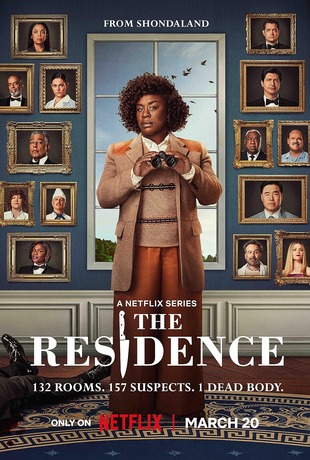
I am so happy to reintroduce television to my reviews for the first time since January. It feels like it’s been forever since I’ve been able to finish a show and I’m so glad this short series got my back on track. I was watching this in between essays, using episodes as a reward for getting segments done or whatever.
In The Residence, a death occurs at the White House during an important state dinner. To solve the case, the bird-watching consulting detective Cordelia Cupp arrives and for a large part of the show, holds everyone after the dinner in order to gather her evidence. However, before she is able to solve the mystery, the case is closed, only to be reopened much later and Cordelia to return to the crime scene to finish her investigation.
So, I love a good murder mystery… It’s not a genre I necessarily seek out but I adore it when it’s presented to me. I love the ambience, the intrigue, the tropes and staples, the playing with a formula. I enjoy trying to figure out the mystery but not quite having the genre savvy to do so reliably. It’s always a good time. I thought this entry into the canon was satisfactory. I enjoyed my time with it, possibly just because I’m frequently charmed by Uzo Aduba and the rest of the cast, but I felt the mystery itself lacked. This was mainly an issue of writing, though the way the editing disguised it is notable. Essentially the story of the night of the murder is being retold at a hearing with interjections from senators. While I enjoyed the punchy cuts between time periods, especially the way dialogue melted between moments, it very often made it feel like the flashes forward were explaining to me what I had just watched take place. This was most egregious in the detective-explains-everything finale, when I felt like the explanation for the killer’s motivation was said many times over, but it was present throughout the entire show. I guess my issue is that I found the mystery far too easy to guess; I never really felt like the red herrings were all that convincing, and I don’t know if that was the mystery itself and all the little details, or how it was framed with the execution.
That brings me to my next point, I have some gripes with the frame. Placing the start of the show with Jasmine set up an interesting thread that was never really pursued, both in the mystery and in the show generally. It quickly shed that frame for focusing on Cordelia, a choice that made sense since she was the main character but just made that opening bit feel off, especially when it wasn’t returned to (in terms of frame; obviously the opening moments were discussed again). It was, frankly, the single most convincing clue the show suggested, but it just seemed irrelevant at a certain point; though it was touched on, the extent was lackluster. I don’t want to give too much away but I suppose I’m doing it anyway—the whole frame of Jasmine’s explanation of the house’s social and work structure seemed inconsequential to the mystery.
It was not, however, inconsequential to the themes of the show; this made it sort of work narratively, but also sort of not work in that I was sort of bored by that choice. Which is to say, it was too patriotic for me at the end there. There are these explicit themes about tradition and wealth but I honestly found them very shallow, in the sense that as someone who does not agree with them intrinsically, it would take more convincing to appeal to me. That’s very much my opinion, and should honestly not be a point of criticism considering how obvious it is with the worldbuilding that occurs in the alternate history. But it affected my viewing of the show so I might as well mention it. Also, unrelated, but most of the jokes fell flat for me.
I thought this show was fine and I enjoyed it, even though it’s not the most tight storytelling. If there was another season I’d love watching Detective Cordelia Cupp (and her FBI assistant) in a new mystery. Also, at the risk of making this a theme for this month’s reviews, I liked this cast. I’ve already mentioned my appreciation of Uzo Aduba, but I’m also a fan of Giancarlo Esposito and Randall Park in the things I’ve seen them in. The ensemble cast worked well to keep my interest and the pacing. I was so worried at the last minute introduction of a romance and new character but I thought it was very sweet and tied into the plot nicely despite its placement. It was a pretty fun show, though I wish there was a little more attention to how the mystery was revealed in terms of clues, reveals, and editing.
Drop Dead Gorgeous (1999, dir. Michael Patrick Jann)
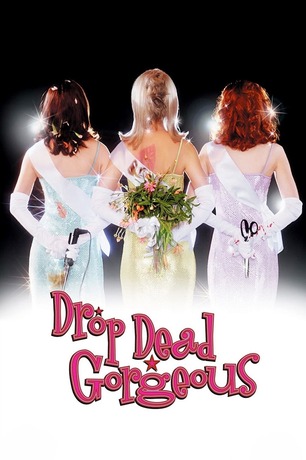
So I found this on a list of queer horror and while it definitely fits squarely into the black comedy genre, I see why it was there. I’m a big fan of black comedy movies, specifically ones that deal with like high school politics; this one is more tangential to all of that, but I’d still group it in the same category. I don’t have a ton to say about it, but I’ll give it a shot.
Drop Dead Gorgeous is a mockumentary about a small midwestern town’s beauty pageant. As the pageant approaches, teen girls are killed off (or otherwise injured), taking out the competition for one contestant.
I might’ve just been off my game, but I could not figure out how this movie worked structurally until the end. I felt like I was being taken on a real roller coaster; possibly this was because I had an idea of where it was going to go that was only partially accurate, and I kept wondering how they’d fit all that into an hour, forty minutes, twenty minutes, et cetera. Aside from that, I enjoyed the mockumentary style. This is generally hit-or-miss for me; it not only worked well here, but I found I was laughing out loud at the jokes, so I thought it was mostly funny. Other jokes didn’t land.
Manual para señoritas / The Lady’s Companion (2025, created by Gema R. Neira)
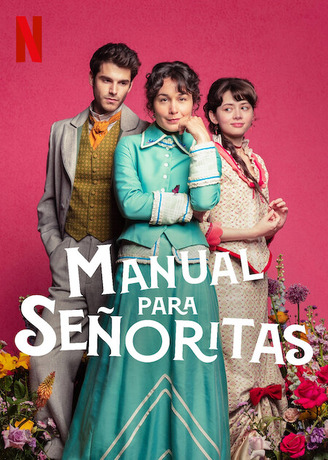
When I started this show I was excited to learn that it’s in Spanish because I am relearning Spanish and I was like, “Oh I can use it to learn vocabulary and stuff.” That’s actually a very particular skill that I need to work on developing and honestly I stopped pretty quickly because I got caught up in the show. With that said, if anyone has Spanish language television to recommend, I’d love to hear about it.
Manual para señoritas follows Elena Bianda, a chaperone in 1880s Madrid who begins to work for the Mencía family and their three daughters. Quickly, the daughters prove to be a handful, but not one Elena cannot handle; a series of romances prove obstacles in her attempt to marry off the eldest daughter.
I thought the art direction for this show was so fun. I’ve heard some complaints about the lack of periodization, but I found that utterly compelling. The beautiful sets with the lovely costumes created such a sweet, charming vibe. The way all anybody ate was strawberries and macarons was genuinely funny and cute. It really set the tone for the show; everything felt so warm and beautiful and perfect for a sweet, romantic story. Despite this tone, the subject matter was not frivolous. The show did a nice job of raising the stakes without bringing down the mood. We learn of a disparity between tone and subject material as early as the first episode, but it never feels disjointed.
Despite the romantic tone and very present material of marriage and romances on screen, the show actually veered away from them in a way I felt was really interesting. Don’t get me wrong—it’s clear the whole time this is a lighthearted historical romance show, but there is an emphasis on the women characters’ perspectives that I appreciated. The men in their lives were always present and relevant, but not focused on in the same way. The show mentioned this pretty explicitly in the narration early on, but other than that it was rarely touched on, making this feel subtle yet foundational to the world. It just made the perspective of the show a little different from what I’m used to seeing in historical dramas without eschewing the context the characters existed in. I thought it struck a nice balance between having these stakes and conversations, while also centering the women characters.
Overall, the characters were really fun. The combination of costumes, performances, and writing made the world feel fun and inviting. I just have to say I was so charmed by them. It did the frequent historical romance thing of pulling away from drama between characters in favor of low conflict moments, but that’s oftentimes a large part of what draws me to this type of show. That’s not to say it’s devoid of conflict, far from it, but the way that conflict is dealt with is quite straightforward a lot of the time. A good example of this is the troubles Sara faces at school, and a large part of the resolution involves her father going in to talk to an administrator. It’s so simple, but I love it. Then at the same time, we get this season-long drama with Cristina’s plot that has all these twists and turns.
In general, I got the sense that while this show is very much in the vein of modern historical romances in terms of subject and style, it still wanted to do something interesting. That it committed to this in all aspects was really nice. I have to say, not one of the romances compelled me, but the characters in them did. Also, I was utterly obsessed with Esther's outfit during the seance episode.
